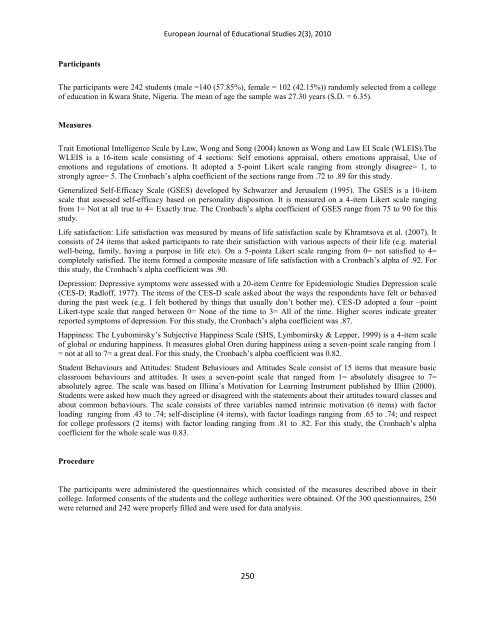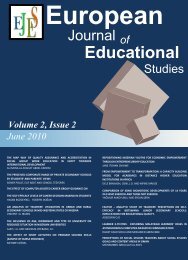emotional intelligence, self-efficacy, psychological well-being and ...
emotional intelligence, self-efficacy, psychological well-being and ...
emotional intelligence, self-efficacy, psychological well-being and ...
Create successful ePaper yourself
Turn your PDF publications into a flip-book with our unique Google optimized e-Paper software.
European Journal of Educational Studies 2(3), 2010<br />
Participants<br />
The participants were 242 students (male =140 (57.85%), female = 102 (42.15%)) r<strong>and</strong>omly selected from a college<br />
of education in Kwara State, Nigeria. The mean of age the sample was 27.30 years (S.D. = 6.35).<br />
Measures<br />
Trait Emotional Intelligence Scale by Law, Wong <strong>and</strong> Song (2004) known as Wong <strong>and</strong> Law EI Scale (WLEIS).The<br />
WLEIS is a 16-item scale consisting of 4 sections: Self emotions appraisal, others emotions appraisal, Use of<br />
emotions <strong>and</strong> regulations of emotions. It adopted a 5-point Likert scale ranging from strongly disagree= 1, to<br />
strongly agree= 5. The Cronbach’s alpha coefficient of the sections range from .72 to .89 for this study.<br />
Generalized Self-Efficacy Scale (GSES) developed by Schwarzer <strong>and</strong> Jerusalem (1995). The GSES is a 10-item<br />
scale that assessed <strong>self</strong>-<strong>efficacy</strong> based on personality disposition. It is measured on a 4-item Likert scale ranging<br />
from 1= Not at all true to 4= Exactly true. The Cronbach’s alpha coefficient of GSES range from 75 to 90 for this<br />
study.<br />
Life satisfaction: Life satisfaction was measured by means of life satisfaction scale by Khramtsova et al. (2007). It<br />
consists of 24 items that asked participants to rate their satisfaction with various aspects of their life (e.g. material<br />
<strong>well</strong>-<strong>being</strong>, family, having a purpose in life etc). On a 5-pointa Likert scale ranging from 0= not satisfied to 4=<br />
completely satisfied. The items formed a composite measure of life satisfaction with a Cronbach’s alpha of .92. For<br />
this study, the Cronbach’s alpha coefficient was .90.<br />
Depression: Depressive symptoms were assessed with a 20-item Centre for Epidemiologic Studies Depression scale<br />
(CES-D; Radloff, 1977). The items of the CES-D scale asked about the ways the respondents have felt or behaved<br />
during the past week (e.g. I felt bothered by things that usually don’t bother me). CES-D adopted a four –point<br />
Likert-type scale that ranged between 0= None of the time to 3= All of the time. Higher scores indicate greater<br />
reported symptoms of depression. For this study, the Cronbach’s alpha coefficient was .87.<br />
Happiness: The Lyubomirsky’s Subjective Happiness Scale (SHS, Lymbomirsky & Lepper, 1999) is a 4-item scale<br />
of global or enduring happiness. It measures global Oren during happiness using a seven-point scale ranging from 1<br />
= not at all to 7= a great deal. For this study, the Cronbach’s alpha coefficient was 0.82.<br />
Student Behaviours <strong>and</strong> Attitudes: Student Behaviours <strong>and</strong> Attitudes Scale consist of 15 items that measure basic<br />
classroom behaviours <strong>and</strong> attitudes. It uses a seven-point scale that ranged from 1= absolutely disagree to 7=<br />
absolutely agree. The scale was based on Illiina’s Motivation for Learning Instrument published by Illiin (2000).<br />
Students were asked how much they agreed or disagreed with the statements about their attitudes toward classes <strong>and</strong><br />
about common behaviours. The scale consists of three variables named intrinsic motivation (6 items) with factor<br />
loading ranging from .43 to .74; <strong>self</strong>-discipline (4 items), with factor loadings ranging from .65 to .74; <strong>and</strong> respect<br />
for college professors (2 items) with factor loading ranging from .81 to .82. For this study, the Cronbach’s alpha<br />
coefficient for the whole scale was 0.83.<br />
Procedure<br />
The participants were administered the questionnaires which consisted of the measures described above in their<br />
college. Informed consents of the students <strong>and</strong> the college authorities were obtained. Of the 300 questionnaires, 250<br />
were returned <strong>and</strong> 242 were properly filled <strong>and</strong> were used for data analysis.<br />
250

















